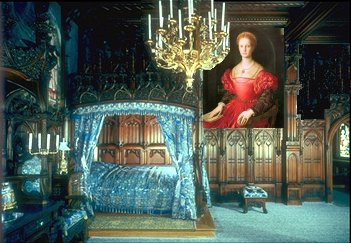
If you visualize the portrait as hanging in the Duke's bedroom, you have chosen the most intimate space of all. Look at how the Duchess looms over the smaller room, watching over the Duke even as he sleeps.

To me, this is the creepiest of the options, and I imagine it would also be the creepiest one for the envoy. Imagine being conveyed into your host's private bedroom; that alone would throw you off balance. And then imagine him chatting about this rather chilling object he's got hanging in there. I get an additional feeling that the envoy is "creeped out" by his evident desire to get out of there as fast as possible, preferably without the Duke! Ferrara says "Nay, we'll go/Together down, sir" (53-54), as if the envoy has been trying to slip out the door while his host nonchalantly pretends not to notice that the poor fellow is trying to get away from him.
Why is the effect so chilling? Well, for one thing because the painting has the curtain over it. Why would the Duke keep a curtain over something that nobody is likely to see in the ordinary way of things? It's like a bad Gothic novel, or a story by Edgar Allen Poe.
Is the Duke so jealous that he can't bear for even the servants who clean his room to gaze upon the Duchess when he isn't there? There is definitely a possibility for jealousy, and not just because she smiled and thanked everybody else as much as she did her husband. He seems to be uncomfortable with the idea of a male gaze on her, even that of a monk:
|
Sir, 'twas not Her husband's presence only, called that spot Of joy into the Duchess' cheek: perhaps Frà Pandolf chanced to say "Her mantle laps Over my lady's wrist too much" or "Paint Must never hope to reproduce the faint Half-flush that dies along her throat": such stuff Was courtesy, she thought, and cause enough For calling up that spot of joy. |
| (14-21) |
Was courtesy, she thought. Not genuine courtesy? Does the Duke mean that the Duchess was too stupid to figure out that somebody was flattering her--in this case, with the motive of making her blush so he could paint her more effectively? Or is he under the impression that Frà Pandolf was flirting with her? Again, was she too stupid to figure that out? Or does the Duke simply hate the fact that she would be willing to allow someone to flirt with her? Is he just imagining that she mistook flirtation or flattery for "courtesy"?
By the way, a mantle is a sort of cloak. I've known people to get confused, thinking this has something to do with a fireplace mantle. What Frà Pandolf means is that the Duchess's wrist is very pretty, and he'd like her to move her sleeve back so he can put it into the picture.
The bedroom option is by far the most emotionally charged. The items that we keep in our bedrooms, after all, are the first things we encounter when we wake in the morning and the last things we see at night. The Duke gives the impression of someone who is gloating...or grieving.
And I do mean serious grieving. Don't discount the possibility that he might have loved the Duchess, and that he truly misses her despite the hard-boiled exterior he strives to maintain. Young men in love don't always marry the most suitable bride. If you are willing to buy the "altruism" theory that I mentioned on the first page about this poem--the fact that the Duke believed he had to have the Duchess put out of the way in order to save his Dukedom and his subjects from a possible danger--he might have sacrificed the love of his life for the good of the land and people for whom he is responsible. And he wants to make sure that he will never have to do that again. Thus the implicit warning to the envoy.